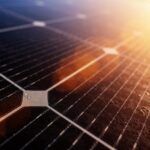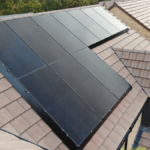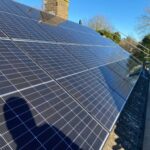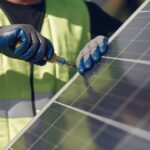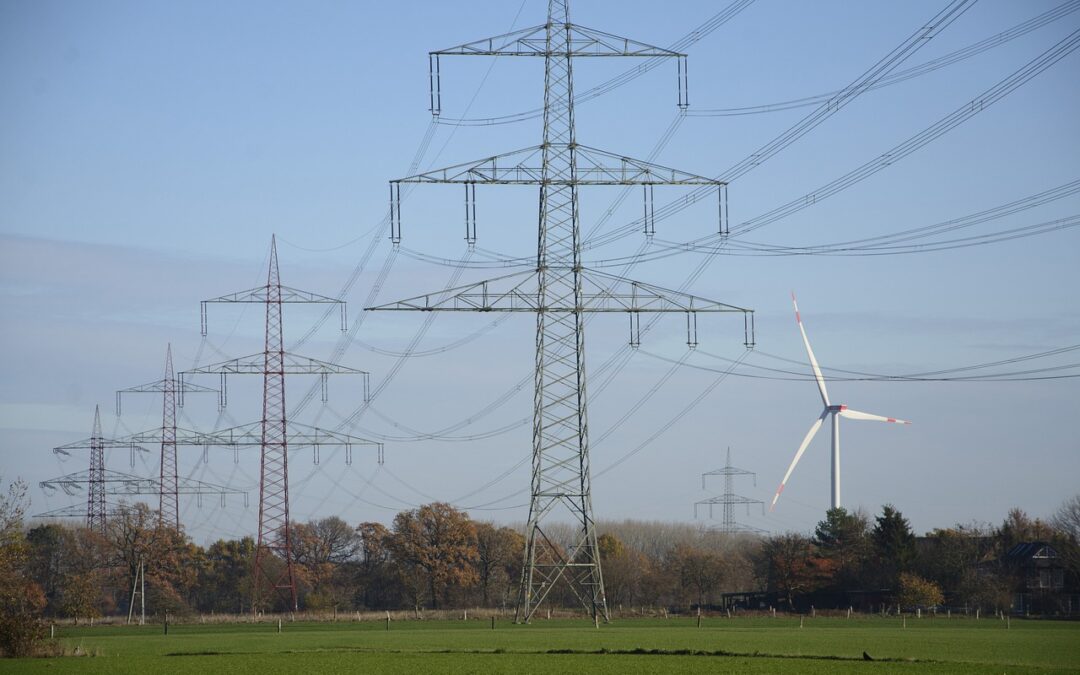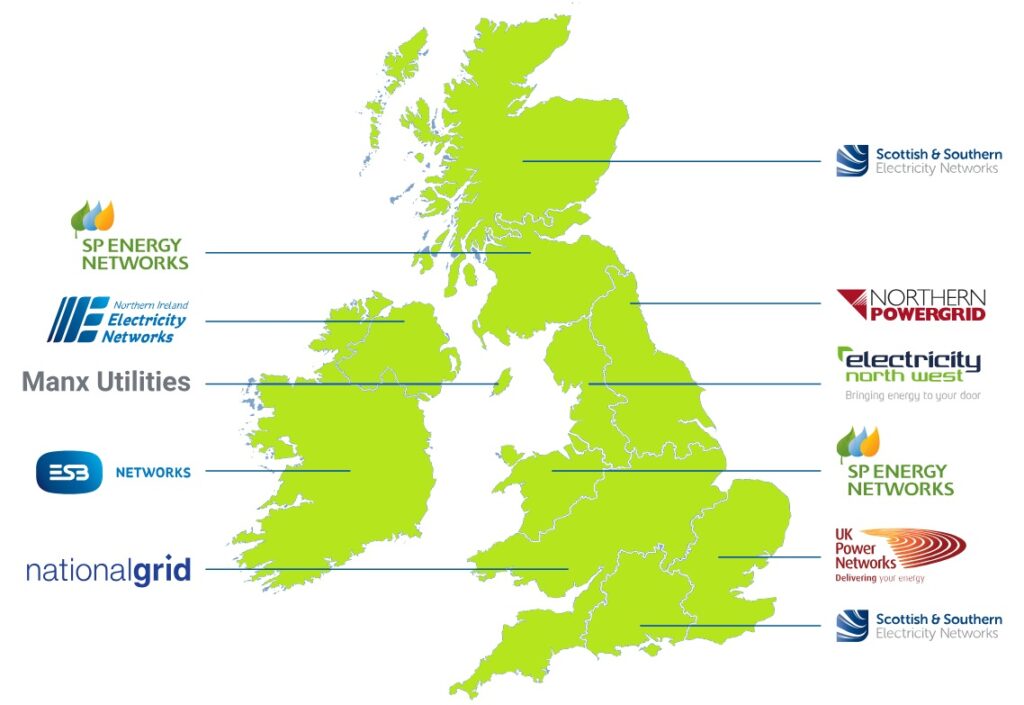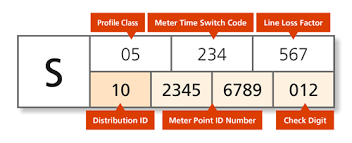


Are you wondering what a DNO application is? Or what does DNO stand for? Then read on and find out everything you need to know about DNO applications for solar panels in the UK!
Understanding DNO Applications – Solar Life Podcast
What is a DNO Application?
You need to let your local DNO know if you want to install solar panels or any other energy device that will connect to the National Grid. This is important for your home or business, because your DNO needs to know how much electricity you will use and produce. You can do this by filling out a DNO application form and sending it to the right DNO for your region.
The type of DNO application you need will depend on the size of your solar PV system and whether you have to apply before or after your installation. Generally, the bigger the solar PV system, the more paperwork you need.
Don’t worry if this sounds complicated. Our in-house solar energy team at NXTGEN Energy will handle any DNO applications for you, so you wont have to worry about your DNO application form.
What does DNO stand for?
DNO is short for Distribution Network Operator. DNOs are companies that have the license to deliver electricity from the National Grid to your home or business. The UK has 14 different district networks or DNO regions, which are owned by 6 groups:
- Electricity North West Limited (ENWL)
- Northern Powergrid
- Scottish and Southern Energy (SEE)
- ScottishPower Energy Networks (SPEN)
- UK Power Networks (UKPN)
- Western Power Distribution (WPD)
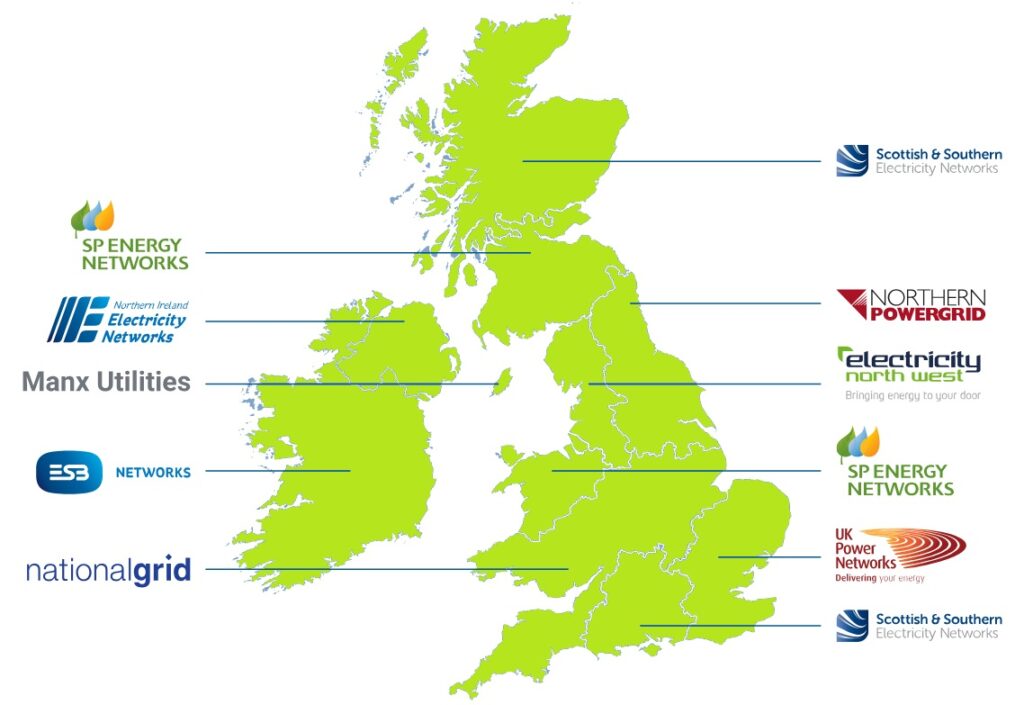
Who is the DNO for my region?
You can easily find out your Distribution Network Operator by going to the Energy Networks Association (ENA) – The voice of the networks website and typing in your postcode. As NXTGEN Energy are a Nationwide solar panel installation company we have worked with all 14 DNOs in the UK.
DNO contact numbers
Finding your Distribution Network Operators (DNOs)
To identify your electricity distributor you’ll need the relevant first two digits shown as part of your MPAN (Meter Point Administration Number).
Your MPAN is the unique identifying number for the electricity meter at your property, often referred to as a ‘Supply Number’ or ‘S’ number. This number is made up of 13 digits highlighted in the bottom row of the illustration below.

For example, the ‘10’ in the bottom row corresponds with the Distribution ID for UK Power Networks in the look-up table below. Alternatively, you can call us on 0845 366 3661 to find out who your electricity distributor is.
The MPAN will be shown on any bills you have, and may also appear on a recent letter or email we’ve sent you.
DNO finder
| MPAN Prefix | DNO Region | DNO Company & Address | Emergency Number | General Enquiries |
|---|---|---|---|---|
10 | East England | UK Power Networks | Free phone number 105 | 0800 029 4285 |
11 | East Midlands | Western Power Distribution | Free phone number 105 | 0800 096 3080 |
12 | London | UK Power Networks | Free phone number 105 | 0800 029 4285 |
13 | North Wales, Merseyside and Cheshire | Scottish Power Energy Networks | Free phone number 105 | 0330 101 0444 |
14 | West Midlands | Western Power Distribution | Free phone number 105 | 0800 096 3080 |
15 | North East England | Northern Powergrid | Free phone number 105 | 0845 070 7172 |
16 | North West England | Electricity North West | Free phone number 105 | 0800 048 1820 |
17 | North Scotland | Scottish and Southern Energy | Free phone number 105 | 0800 048 3516 |
18 | Central and Southern Scotland | SP Energy Networks | Free phone number 105 | 0330 101 0444 |
19 | South East England | UK Power Networks | Free phone number 105 | 0800 029 4285 |
20 | Southern England | Scottish and Southern Energy Power Distribution | Free phone number 105 | 0800 048 3516 |
21 | South Wales | Western Power Distribution | Free phone number 105 | 0800 096 3080 |
22 | South West England | Western Power Distribution | Free phone number 105 | 0845 601 2989 |
23 | Yorkshire | Northern Powergrid | Free phone number 105 | 0800 011 3332 |
24 | Independent | Independent Power Networks Ltd | Free phone number 105 | 01359 243311 |
25 | Independent | ESP Utilities Group | Free phone number 105 | 01372 587 500 |
26 | Independent | Energetics Electricity Ltd | Free phone number 105 | 01698 404949 |
27 | Independent | The Electricity Network Company Ltd (GTC) | Free phone number 105 | 01359 243311 |
28 | Independent | UK Power Networks (IDNO) Limited | Free phone number 105 | 0800 029 4285 |
When do you need to apply for a DNO application?
You need to tell your local DNO provider if you are making any big changes to your electricity connection. A big change means installing any of these green energy devices:
- Solar photovoltaic (PV) Panels
- Heat pump
- EV Electric Vehicle Chargers
- Solar Battery Storage that has back up/islanding* functionality
* Islanding is the condition in which Distributed Generation (DG) equipment like solar battery storage continues to power a location even though external electrical National Grid power is no longer present. Islanding can be dangerous to utility workers, who may not realize that a circuit is still powered, and it may prevent automatic re-connection of devices.
Can you avoid DNO permission?
You need DNO permission for any solar PV system or EV Charger that connects to the National Grid, unless it is an off-grid system. This is because you have to follow the National Grid rules in your region when you connect to it. The National Grid rules will help the UK reach Net Zero in 2050 by managing the growing use of electric devices or energy assets like electric cars and heat pumps. You have to let your local DNO know so they can handle the extra demand and pressure on the National Grid. This is important for avoiding local power cuts and making sure the supply in your region is efficient.
Why do you need a DNO certificate for solar panels?
You need a DNO certificate to install a solar panel system that connects to the National Grid. Otherwise, you will miss out on the Smart Export Guarantee (SEG) scheme payments from the National Grid, which is a reward for being connected to the National Grid.
Different types of DNO applications for solar panels
The type of DNO application you need depends on the size of your solar PV system. The size is measured by the AC inverter rating, not the peak DC rating of the solar panels. There are two main types of DNO applications: “connect and notify” or “apply to connect”.
DNO G98 Applications
For small-scale Distributed Generation (DG) equipment at your home or business, you need to contact an MCS certified solar PV installer, like NXTGEN Energy. Your system must be under 16A per phase to be small-scale. That means 3.68kWp for a single-phase supply or 11.04kWp for a three-phase supply. If you are not sure about your system size, you should ask your solar panel installer.
Your installer will do an Adequacy of Supply (AoS) check to see if your current electricity supply can handle the extra load. If it can, your installer can put up your solar panels without asking for the DNO first. But you will have to tell the DNO within 28 days after the solar PV system is set up. This is because a small-scale system usually does not cause any problems for your local grid. If your current supply is not good enough, your installer may have to upgrade it before installing the solar panels.
G98 DNO Applications are currently taking a couple of days to be approved, but this is dependant on your location within the UK and your DNO Provider.
DNO G99 Applications
For large-scale solar systems, greater than 16A per phase, you will have to get DNO approval before installation. This is because the National Grid has to check if your local distributor can deal with the extra load. The DNO may take 8 to 12 weeks to review your DNO application. If your Distributed Generation (DG) equipment is rated at 50kW or more, you will have to fill out a Standard Application Form (SAF) as well.
G99 DNO Applications for Solar Inverters below 5kW are currently taking about 4-5 days to be approved, but Solar Inverters over 5.5kW are taking between 45-90 days due to the fact that a Project Manager from your DNO Provider needs to be involved and checks your Solar PV System design. Also your location within the UK and your DNO Provider may have many solar panel installs to approve, so if you are in a queue the time scale may be longer in some cases.
DNO G100 Applications
If your G99 application says that your system’s export has to be limited, you’ll need a G100 application form. At NXTGEN Energy, about 5% of our DNOs for solar panels get limited. A G100 DNO will cost you an extra £300-£750 for the application, and it will also take longer to install your solar PV system, because you’ll need an extra device with it.
The outcomes of a DNO application
You will usually get a connect offer letter after your DNO application is checked. This tells you the maximum specification of the connection and if you have to pay any connection charges. There are usually three results of a DNO application.
- Your application is approved: your DNO is fine with the size of the solar PV system you want to install. This means you can go ahead with your installation, with no extra costs or changes.
- The system size is limited to a certain kWp AC rating: you need an export limitation. Sometimes you’ll have to pay a small fee for a DNO witness test, where your provider makes sure a limitation is in place.
- You need to upgrade your supply size from a single-phase to a three-phase system to install your solar panels: this extra charge can be expensive depending on the site, and is normally related to the size of your property.
If the DNO rejects your application to connect, you may have to install an export power management system to control the electricity generated from the solar PV system that goes to the National Grid.
How much does a DNO application cost?
You don’t have to pay for the G98 DNO application for “connect and notify”, but your solar panel installers may charge you some fees to handle the application. The G99 and G100 applications can cost you anywhere between £300 – £750 each, with Scottish Power often being the most expensive as your DNO sets the price.
How long does a DNO application take?
The DNOs are taking longer to process because of the high demand for homegrown energy in the last year. A G98 application for solar panels usually takes about 3 months, but a G99 can take up to 4-6 months lately, even though it is supposed to only take around 8-12 weeks.
MCS Certified Solar Panel Installers
You don’t have to worry about DNO applications, if you choose NXTGEN Energy, the experts in DNOs for solar panels. If you want to install solar panels, solar batteries or EV chargers for your home or business in the UK, call our solar energy team today at 01268 928 690, email info@nxtgen.ltd or click on the button below and get our 5-Star service. We include all DNO applications in our solar packages, and we serve the whole country, so don’t hesitate to contact us.
Frequently Asked Questions about DNO Applications
Latest Solar Panel Posts
- Solar Panels: Pros, Cons, and Whether They’re Worth ItSolar panels can cut your energy bills by up to 70%, and surplus electricity can be sold back to the National Grid through the Smart Export Guarantee (SEG) Scheme. They reduce your carbon footprint, require minimal maintenance, and can last over 30 years, making them a long-term eco-friendly investment. Upfront costs are… Read more: Solar Panels: Pros, Cons, and Whether They’re Worth It
- UK Schools and Hospitals to Receive £180 Million Solar InvestmentSolar Investment: The UK government, through Great British Energy, is investing £180 million to install solar panels on 200 schools and 200 hospitals as part of its net-zero carbon strategy. Benefits: This initiative aims to cut energy costs, reduce carbon emissions, and enhance energy security by reducing reliance on imported fossil fuels. … Read more: UK Schools and Hospitals to Receive £180 Million Solar Investment
- Understanding Solar Panel EfficiencySolar panels convert sunlight to electricity through photovoltaic cells, storing extra energy for later use. There are three main types of solar panels: monocrystalline, polycrystalline, and thin-film. Monocrystalline panels lead in efficiency (20%+), but new technologies are improving performance continuously. Solar panels save money, boost property value & reduce environmental impact,… Read more: Understanding Solar Panel Efficiency
- How SolaSkirt Can Protect Your Solar PanelsPigeon Issues: Pigeons under solar panels damage cables, leave guano, spread disease & create noise. SolaSkirt Fix: Aluminium barrier that blocks pigeons, enhances panel look, and installs without damage. Top Benefits: Durable, weatherproof, maintenance-free, and improves aesthetics & efficiency of panels. Cost-Saving: An affordable pigeon proofing solution that prevents expensive future… Read more: How SolaSkirt Can Protect Your Solar Panels
- Are Brits Turning Their Backs on Solar Panels?High upfront costs: Deter many Brits from installing solar panels despite falling prices & financing options. Myths debunked: Solar panels work in cloudy weather, need minimal maintenance & can last 25–30 years. Financial & Environmental benefits: Solar panels cut electricity bills by up to 70% & lower carbon footprints. Government support… Read more: Are Brits Turning Their Backs on Solar Panels?
- Choosing the Best Solar Panel System InstallerChoose MCS certified installers with Solar PV and Battery Storage Certificates for quality & incentives. Pick local installers familiar with Essex, Kent, and London’s weather and building regulations. Look for full-service solar installers from consultation to maintenance with MCS certification. NXTGEN Energy offers tailored solar panel systems for homeowners in Essex,… Read more: Choosing the Best Solar Panel System Installer
- Solar Panel System Maintenance in the UKRegular Maintenance: Ensures optimal performance, maximizes energy efficiency & prevents costly repairs. Common Issues in the UK: Dirt, debris, bird droppings & ice build-up require regular cleaning & inspections. Best Practices: Clean panels with soft cloth & water, monitor performance & schedule maintenance visits. Seasonal Tips: Spring cleaning, summer heat protection,… Read more: Solar Panel System Maintenance in the UK
- Are solar panels worth it? NXTGEN Energy’s guide to getting startedInstalling solar panels can significantly reduce electricity bills, with prices dropping in recent years. Solar panels are a good investment for those with the space, daytime electricity usage & a south-facing roof. Consider financing options carefully, as borrowing can be expensive; paying outright provides better returns. Solar batteries store energy for… Read more: Are solar panels worth it? NXTGEN Energy’s guide to getting started
- How Amazon is Preparing for the Energy Needs of the FutureAmazon has over 600 renewable energy projects globally, with 230+ in Europe. These efforts support Amazon’s goal of net-zero carbon emissions by 2040. Amazon remains the top global and European corporate renewable energy buyer for the fifth year. Key achievements include 46 new projects in Europe, doubling Japan’s capacity & 53 projects in India. Discover… Read more: How Amazon is Preparing for the Energy Needs of the Future
- How Solar Panels Are InstalledWhat you can expect from a solar panel installation Solar panel installations typically take about a day to complete, depending on the complexity of the system. Solar panel installations require scaffolding, fixing brackets, wiring, inverter & interconnection to the grid. Solar panel installations need to be done by MCS Certified installers, who… Read more: How Solar Panels Are Installed
- How Solar Panels Increase Property ValueSolar panels can boost your home’s value by an average of £2,000 & command a price premium of 0.9% to 2%. Homes with solar panels have better EPC ratings, which can increase property value by up to 14%. Eco-friendly homes are in high demand, making solar-powered homes more attractive to buyers. … Read more: How Solar Panels Increase Property Value
- Did You Know That Solar Costs Have Fallen by 82%?Solar panel costs have dropped by 82% since 2010, making solar energy more accessible for UK homeowners. Factors to consider before switching to solar include initial investment, energy savings, and roof suitability. Government incentives, such as the Smart Export Guarantee (SEG) scheme, can help offset the initial costs. NxtGen Energy offers… Read more: Did You Know That Solar Costs Have Fallen by 82%?


 DNO Application For Solar Panels...
DNO Application For Solar Panels...

